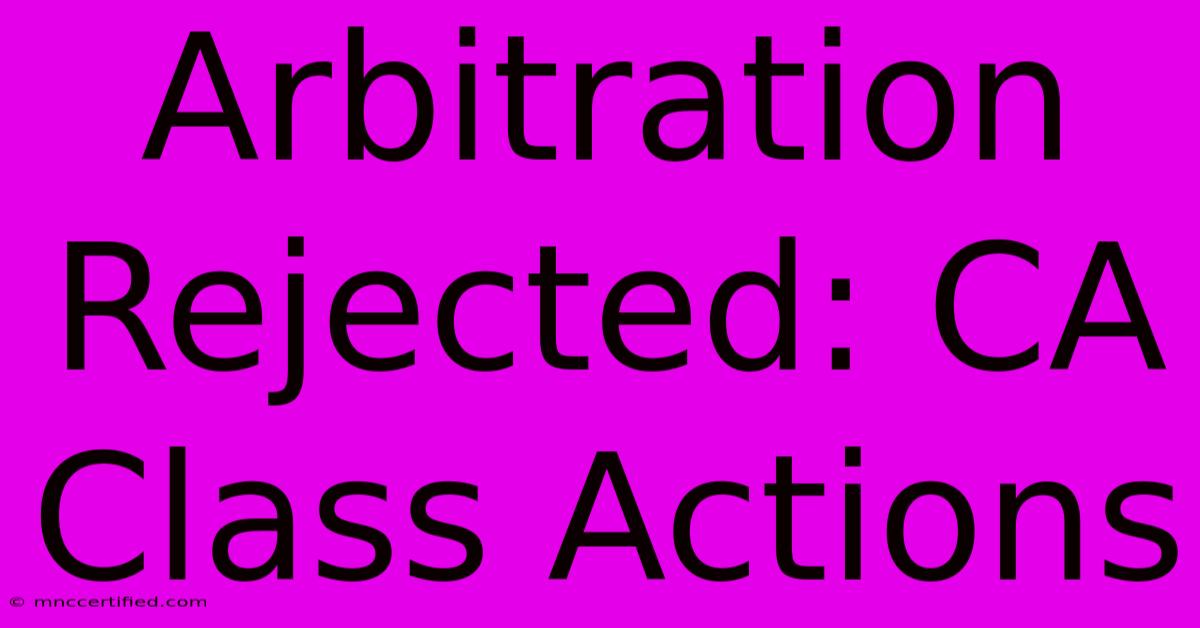Arbitration Rejected: CA Class Actions

Table of Contents
Arbitration Rejected: CA Class Actions – Understanding Your Rights
California class action lawsuits are powerful tools for consumers and employees to seek redress for widespread harms. However, companies often attempt to sidestep these lawsuits by including mandatory arbitration clauses in contracts. These clauses force individuals to resolve disputes privately through arbitration instead of pursuing a class action in court. But increasingly, California courts are rejecting attempts to enforce these clauses, opening the door for class action litigation in significant cases. This article explores the complexities of arbitration clauses in California class actions and what it means for you.
The Rise and Fall (Sometimes) of Mandatory Arbitration Clauses
Mandatory arbitration clauses are frequently found in employment agreements, consumer contracts, and other agreements. Companies favor these clauses because they often offer a perceived cost-effective and less public method of dispute resolution. Arbitration can be significantly cheaper and less transparent than a full-blown class action lawsuit.
However, California courts have shown a growing willingness to invalidate these clauses, particularly when they are used to prevent legitimate class action claims. This is largely due to California's strong consumer protection laws and public policy favoring access to the courts for individuals harmed by widespread wrongdoing.
Why Courts Reject Arbitration in CA Class Actions
Several key reasons contribute to California courts rejecting mandatory arbitration clauses in the context of class actions:
-
Unconscionability: A contract or clause is unconscionable if it is so unfair and one-sided that it shocks the conscience. Courts often find arbitration clauses unconscionable if they are hidden in lengthy agreements (a lack of procedural unconscionability), or if the terms themselves heavily favor one party (a lack of substantive unconscionability). This is especially true when the clause prevents the pursuit of collective redress for relatively small individual claims where individual arbitration would be economically infeasible.
-
Violation of Public Policy: California's strong public policy supporting class actions aims to deter harmful practices by allowing collective action against companies engaging in widespread wrongdoing. Enforcing arbitration clauses that effectively prevent these class actions undermines this public policy.
-
Waiver of Rights: Courts carefully scrutinize whether individuals knowingly and voluntarily waived their right to pursue class action litigation. If the arbitration clause is buried deep within a lengthy contract or presented in confusing language, the court may find that no valid waiver occurred.
What Does This Mean for You?
If you've signed a contract with a mandatory arbitration clause and believe you've been harmed as part of a larger group, this recent trend in California courts offers some hope. The possibility of a class action lawsuit, rather than individual arbitration, may be a more viable avenue for redress.
Key Considerations:
-
Consult with an Attorney: If you believe you are a victim of a company's harmful practice and your contract contains a mandatory arbitration clause, immediately consult with a qualified California class action attorney. They can assess the validity of the clause and advise you on the best course of action.
-
Understanding Your Contract: Carefully review any contracts you sign. Pay close attention to arbitration clauses and understand their implications. If you have questions, seek legal advice before signing.
-
Staying Informed: Keep updated on legal developments concerning arbitration clauses and California class actions. Legal precedents continue to evolve.
Navigating the Legal Landscape
The landscape surrounding arbitration clauses in California class actions is complex and constantly evolving. While the courts are increasingly willing to reject these clauses, the outcome of each case is fact-specific. The strength of your case, the specific language of the arbitration clause, and the overall context of the situation will all be crucial factors in determining whether a court will enforce the clause or allow a class action to proceed.
Disclaimer: This article is for informational purposes only and does not constitute legal advice. It is crucial to consult with an attorney for advice tailored to your specific situation.

Thank you for visiting our website wich cover about Arbitration Rejected: CA Class Actions. We hope the information provided has been useful to you. Feel free to contact us if you have any questions or need further assistance. See you next time and dont miss to bookmark.
Featured Posts
-
Holiday Let Property Insurance
Nov 27, 2024
-
Does Insurance Cover Baker Act
Nov 27, 2024
-
5000 Sign General Election Petition Call
Nov 27, 2024
-
Wendy Williams Health Guardian Update
Nov 27, 2024
-
Georgia Insurance Check By Vin
Nov 27, 2024